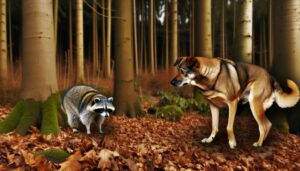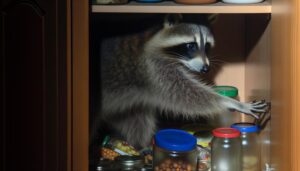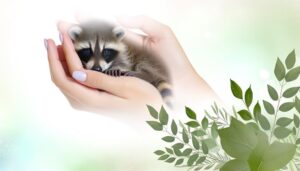How You Can Legally Have a Pet Raccoon in Alberta
In Alberta, keeping a raccoon as a pet is prohibited under the Alberta Wildlife Act. The law aims to protect ecosystems and public health by restricting the possession, sale, and import of raccoons.
Raccoons are controlled animals due to their potential to become invasive and transmit diseases, posing both ecological and health hazards. Compliance with these regulations is essential to maintain biodiversity and prevent ecological imbalances.
Attempting to keep a raccoon can result in severe penalties, including fines and imprisonment. Learn about the intricate details of these regulations and the implications of pet ownership in Alberta.

Key Takeaways
- Keeping raccoons as pets is prohibited under the Alberta Wildlife Act.
- Raccoons are classified as controlled animals to protect ecosystems and public health.
- Possessing, selling, or importing raccoons without authorization can result in fines and imprisonment.
- Raccoons pose significant health risks, including diseases like rabies and leptospirosis.
- Alternatives to raccoons as pets include domestic cats, dogs, and small mammals.
Alberta Wildlife Regulations
Alberta's wildlife regulations strictly prohibit the keeping of raccoons as pets due to their classification as a controlled animal under the Alberta Wildlife Act. This classification is designed to protect native ecosystems and public health.
Raccoons, being opportunistic feeders and highly adaptable, can become invasive if they escape or are released into the wild. They pose risks to indigenous species and can transmit diseases such as rabies and leptospirosis to humans and other animals.
The regulations mandate that individuals refrain from domesticating raccoons to prevent ecological imbalances and potential health hazards. Adhering to these regulations is essential for maintaining biodiversity and ensuring the safety of both humans and wildlife.
Legal Restrictions
The legal restrictions on keeping raccoons as pets in Alberta are rooted in the Alberta Wildlife Act, which explicitly prohibits the domestication of these animals. According to the Act, raccoons are classified as 'controlled animals,' and it is illegal to possess, sell, or import them without specific authorization.
This prohibition is enforced to protect both human and ecological health, as raccoons can carry diseases such as rabies and distemper. Additionally, the introduction of non-native species into Alberta's ecosystems can disrupt local wildlife and biodiversity.
Violating these regulations can lead to significant legal penalties, including fines and potential imprisonment. As a result, adherence to these legal restrictions is essential for maintaining public safety and environmental integrity.
Permit Requirements
Obtaining a permit to keep a raccoon in Alberta is a strict process governed by rigid regulatory guidelines. Prospective pet owners must first apply through Alberta Fish and Wildlife, detailing the purpose and conditions under which the raccoon will be kept.
The application requires thorough information, including housing specifications, dietary plans, and veterinary care provisions. Additionally, applicants must demonstrate that they possess the necessary knowledge and facilities to ensure the raccoon's welfare.
An inspection of the premises by wildlife officials may also be mandated. Approval is contingent upon meeting demanding standards designed to protect both the animal and the public.
Non-compliance can result in severe penalties, including fines and confiscation of the raccoon.
Health and Safety Concerns
Owning a pet raccoon in Alberta presents significant health and safety concerns. Primarily centered around disease transmission risks and injury hazards. Raccoons are known carriers of zoonotic diseases such as rabies and Baylisascaris procyonis. Which can pose serious health threats to humans and other animals.
Additionally, their sharp teeth and claws make them capable of inflicting harmful bites and scratches. This increases the risk of injury.
Disease Transmission Risks
In Alberta, the risk of disease transmission from pet raccoons to humans and other animals poses significant health and safety concerns. Raccoons are known carriers of several zoonotic diseases, including rabies, leptospirosis, and raccoon roundworm (Baylisascaris procyonis).
Rabies, a fatal viral disease, can spread through bites or scratches, while leptospirosis, a bacterial infection, can be transmitted via raccoon urine. Raccoon roundworm eggs, found in raccoon feces, can cause severe neurological damage if ingested. These pathogens not only endanger human health but also threaten domestic pets and wildlife.
Stringent public health measures and regulations are essential to mitigate these risks and protect community well-being. Consequently, the potential for disease transmission underscores the complexity of keeping raccoons as pets.
Injury and Bite Hazards
Raccoons possess sharp teeth and claws, making them capable of inflicting serious injuries through bites and scratches, which pose significant health and safety hazards for their owners and others.
Their bites can cause deep puncture wounds, leading to severe infections if not properly treated. Additionally, raccoon saliva may contain harmful bacteria and viruses, such as rabies, that can be transmitted through bites. Claw scratches can also result in serious lacerations, potentially requiring medical intervention.
For individuals working in healthcare or animal care, it is vital to be aware of these risks and take appropriate precautions, including vaccination and the use of protective equipment, to minimize injury and guarantee the safety of both humans and animals.
Raccoon Behavior
Understanding the behavior of raccoons is essential for anyone considering them as pets in Alberta. Raccoons are highly intelligent, curious, and active nocturnal mammals, often displaying behaviors such as foraging, climbing, and problem-solving. These omnivores have dexterous front paws, enabling them to manipulate objects and open containers, which can lead to mischief if unsupervised.
Socially, raccoons exhibit complex interactions; they can be both solitary and social, depending on environmental conditions and resource availability. Importantly, raccoons can be unpredictable, occasionally exhibiting aggressive behavior, particularly when threatened or cornered. Their natural instincts drive them to explore and interact with their surroundings extensively, making them demanding pets that require significant attention and understanding of their intrinsic behavioral patterns.
Care and Maintenance
Proper care and maintenance of a pet raccoon in Alberta necessitates a thorough understanding of their dietary needs, habitat requirements, and healthcare considerations. Raccoons are omnivorous and require a balanced diet, including fruits, vegetables, protein, and specialized supplements.
Their habitat must mimic natural conditions to promote mental and physical well-being. A well-rounded mix of fruits, vegetables, and proteins is essential for their diet. Secure, spacious enclosures are necessary to provide stimulation and safety.
Regular veterinary check-ups and vaccinations are crucial for their healthcare. Maintaining a raccoon's health also involves regular grooming and monitoring for signs of illness.
Understanding these facets ensures raccoons receive the best care, contributing to their overall quality of life and longevity.
Ethical Considerations
When considering the ethical implications of keeping a pet raccoon in Alberta, it is essential to address the welfare and well-being of the animal, ensuring it receives appropriate care in a non-native environment.
Additionally, the potential environmental impact of introducing a raccoon into a new habitat must be assessed, as it may disrupt local ecosystems.
These factors necessitate a thorough evaluation to balance human desires with ecological responsibility.
Welfare and Well-being
Ensuring the welfare and well-being of a pet raccoon in Alberta demands rigorous attention to their complex behavioral, nutritional, and environmental needs. Ethical considerations emphasize the importance of replicating natural habitats to prevent stress and unhealthy behaviors.
Raccoons are highly intelligent and require constant mental stimulation to thrive. Their dietary needs are diverse, necessitating a balanced intake of proteins, fats, and carbohydrates.
Behavioral Enrichment:
Provide puzzles, toys, and activities that mimic foraging and problem-solving tasks.
Nutritional Balance:
Offer a diet that includes fruits, vegetables, and protein sources, avoiding processed foods.
Environmental Enrichment:
Design a spacious enclosure with climbing structures and hiding spots to simulate their natural environment.
Meeting these needs is essential for ensuring ethical and humane treatment.
Environmental Impact
Understanding the welfare of pet raccoons also necessitates examining their environmental impact and the broader ethical considerations of keeping such animals in captivity.
Raccoons are inherently wild animals, and their introduction into domestic environments can disrupt local ecosystems. Escape or release of captive raccoons poses risks, including the spread of diseases such as rabies and the potential to outcompete native species for resources.
Additionally, the ethical implications of confining a raccoon, an animal evolved for wide-ranging habitats, merit serious consideration. Captivity often fails to meet their complex behavioral and ecological needs, leading to potential psychological stress and maladaptive behaviors.
Ethical stewardship involves recognizing these impacts and prioritizing the welfare and ecological balance over personal desire for exotic pets.
Alternatives to Raccoon Pets
For those considering companion animals, there are numerous alternatives to pet raccoons that are both legal and well-suited to domestic life in Alberta.
Selecting an appropriate pet guarantees the well-being of both the animal and the owner, fostering a harmonious living environment.
Some viable options include:
- Domestic Cats: Well-adapted to indoor environments, offering companionship and requiring manageable care routines.
- Dogs: Versatile in size and temperament, dogs provide loyalty and can be trained to perform various tasks, enhancing human-animal bonds.
- Small Mammals (e.g., Guinea Pigs, Hamsters): These animals are relatively low-maintenance, making them suitable for those with limited space and time.
Each alternative offers distinct benefits, aligning with the diverse needs and lifestyles of potential pet owners.
Conclusion
In Alberta, the legal terrain concerning raccoon ownership is similar to winding through a maze, with strict wildlife regulations and permit requirements acting as formidable gatekeepers.
Paired with the health and safety hazards, unpredictable raccoon behavior, and demanding care needs, the idea of keeping a raccoon as a pet becomes filled with complexities.
Ethically, it behooves potential pet owners to explore alternative animals better suited to domestication, thereby ensuring a harmonious coexistence with wildlife.






